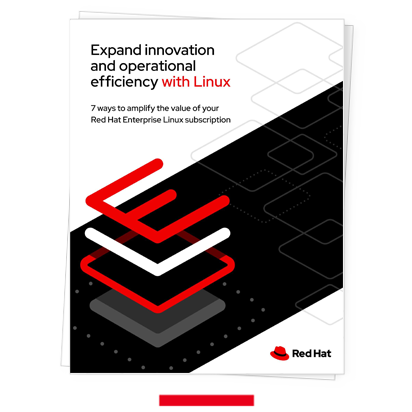Peerspot reviews
Red Hat Enterprise Linux
PeerSpot asked certified professionals to share their opinions and advice about Red Hat® Enterprise Linux®, the world’s leading enterprise Linux platform. Find out how real users rely on Red Hat Enterprise Linux as the foundation to achieve their goals, scale their organizations, and expand into the future.
Featured topic
What people are saying about CentOS Linux migration
On June 30, 2024, CentOS Linux 7 will reach End of Life (EOL). If you’re on CentOS Linux 7, now is the time to prepare and get your migration plans in place. Learn how customers like you have benefitted from migrating to Red Hat Enterprise Linux.
Previously, we used CentOS. We have also used Oracle Linux, which is based on Red Hat Enterprise Linux's kernel. Now, we're strictly trying to use Red Hat Enterprise Linux. We switched to Red Hat Enterprise Linux because it provides great support…The solution has helped us streamline and optimize our infrastructure for any applications or databases we run on a Linux operating system.

Among the other distributions of Linux out there, I would rate it as 10 out of 10. If I have to compare this solution against everything else out there, this solution is at the top of the list.
Jude Cadet
Sr. Systems Engineer
Explore how your peers found value in Red Hat Enterprise Linux
Stability
reviewer2197251
Cloud Engineer
One of the main reasons we chose Red Hat Enterprise Linux was its reliability and stability. Compared to the Microsoft Windows environment, the Linux environment provided much greater stability. Therefore, we decided to use Red Hat Enterprise Linux for all our critical applications at that time, as they required a Linux-only environment.
Usam Malik
Joint Director
RHEL enables us to deploy current applications and emerging workloads across all virtualized hybrid cloud and multi-cloud environments. It is one of the most stable OS that are available.
Andrew McClintock
Team Lead
The product saved us a lot of money compared to other products, like Solaris. Also, having one OS as opposed to many OSs is nice. For the most part, the benefit for the organization is saving money compared to other operating systems and having good stability.
reviewer2197263
Senior System Engineer
We've absolutely seen an ROI. It's in terms of reliability, stability, security, and usability. You name it. The use cases are out there.
Analyst material
Integration
Sochima Ezekwesili
Infrastructure Engineer
We could easily and quickly integrate any cloud solution, virtualization solution, storage solution, or software with the RHEL system. It is better than the other solutions we have worked with.
RicardoURQUIDI
CEO
Red Hat at present is the core, and we are also using Ansible, Horizon, OpenShift, and Kubernetes in our environment. They are a part of our environment. It is the best in terms of integration, and it is totally integrated with other solutions. With these integrations, all other solutions become a part of one big solution, which saves time. You can achieve the same results by building things from scratch with open source, but it would be very time-consuming. Deployments become easy and fast because everything is integrated. It is very good to have everything integrated, and we now have just two people working with the whole infrastructure.
TJ
Cloud and Infrastructure Architecture
Having this integrated solution approach provides us with greater operational excellence because we can see what somebody is building. We have the environment captured and have visibility about what went into it for repeatability, reproducibility, scalability, and lots of other benefits.

Paul Monroe
CTO
We have significantly reduced operational expenditures since switching to RHEL. It was a reduction of more than 10 percent.
Scalability

Russell Burgos
Compute & Storage Associate Engineer
It is easy to move workloads between the cloud and our data center using Red Hat Enterprise Linux…Red Hat Enterprise Linux's scalability is easy to manage. We can simply spin up more instances as needed, and then turn them off when we no longer need them. This means that Red Hat Enterprise Linux's scalability is not as much of an issue with the cloud provider.
Usman Malik
Joint Director
Scalability is excellent. With the introduction of hybrid and multi-cloud support, one can scale up as well as scale out his workloads pretty easily. We usually scale up our traditional workloads when we need more resources i.e., during peak seasons.
Rudolf Rojas
Information technology specialist
I like its user-friendliness for the admins administering the servers and the ease of doing fix packs on the servers and upgrades with the Red Hat software. It saves time and cost because we don't need to have expensive hires to do the work. We can do it ourselves a lot of times. It's a pretty straightforward, easy-to-learn, and user-friendly operating system.
Usman Malik
Joint Director
Cost of running operations and the scalability factors make RHEL a good choice for providing a better ROI. The feature set it offers, support for a variety of applications, ease of deployment, and an excellent level of support all result in a good ROI.
Automation
Joseph Gust
Compute & Storage Associate Engineer
Red Hat Enterprise Linux solved our need for automation and running containers. It is the most stable open source operating system available… In one form or another, Red Hat Enterprise Linux is running on our systems. If we are not running Red Hat Enterprise Linux, our systems are unstable.
Trevor Omondi
Enterprise Systems Engineer
There is definitely an ROI. Automation definitely reduces the time taken to implement a particular task and the number of employees needed to do the same task. For me, it's majorly in terms of automation, uptime, and availability.
Gabriel Karl Mbega
CEO
Productivity and efficiency are key advantages because the solution automates regular tasks and processes. All of this benefits our company.
reviewer2021337
Cloud Architect
Through the various tools that we've utilized, RHEL was able to help improve our security posture. We run a very tight ship.
We use Satellite to do patch management and limited repository so that we don't have folks going out to the internet to get the repos. You have to get the repos through our Satellite system. We also do patches through that. We use Ansible for our automation to build boxes, to install all the security patches on them, and to run the vulnerability scan against them. It initiates that. Also, implementing IdM on them is done through Ansible. So, we use Ansible quite a bit, and we're just starting with OpenShift.
Migration
reviewer2197296
Senior Linux System Administrator
I like my developer account. The free sixteen licenses that they give with the developer account are great because that gives me the ability to keep using it at home instead of trying CentOS or something like that. Once CentOS went away or changed, I had the ability to just make a developer account and spin up my entire lab in Red Hat, which made it better anyway because that's what we use at work, and now I have a one-to-one instead of a clone-to-one.
reviewer2298876
IT Manager
Previously, we used CentOS. We have also used Oracle Linux, which is based on Red Hat Enterprise Linux's kernel. Now, we're strictly trying to use Red Hat Enterprise Linux. We switched to Red Hat Enterprise Linux because it provides great support…The solution has helped us streamline and optimize our infrastructure for any applications or databases we run on a Linux operating system.
Sean Sawka
Senior Software Engineer
We run most things on the solution and its impact has been huge. We do have a few items on Ubuntu but question its use. Conceptually, Ubuntu is for amateurs and RHEL and CentOS are for professional organizations with hardened security.

Bassel Nasreldin
Digital Solutions Architect
I previously used CentOS, which is related to Red Hat. It was our client who decided to switch to Red Hat. I've also used Ubuntu which is an open-source solution with low security and therefore not suitable for enterprise-size organizations.
Standardization

Nicolae
System and Solutions Architect
We use Ubuntu and SUSE. We switched to Red Hat mainly for the enterprise support that we receive, the documentation, and the container integration…I strongly recommend RHEL as it fits well in on-premises or cloud development, whether for a small or a large company, and it's a professional product.
reviewer2298846
Principal Architect
We love using Red Hat Satellite. We have close to 5000 servers. Managing individual servers would be a nightmare…I have used Red Hat Insights. It gives us insight into what's happening on every single Red Hat VM that we have. It tells us if it's behind or has some performance bottlenecks. It gives us visibility on the health of the whole OS.
reviewer2197263
Senior System Engineer
Red Hat Enterprise Linux has enabled us to centralize development in our hybrid cloud environment because the containers can be migrated from Red Hat Enterprise Linux to AWS.
reviewer2197251
Cloud Engineer
It is important to our organization to have a solution that avoids cloud vendor lock-in. We just don't want to be locked into just one side or the other. We want to have the flexibility and availability to explore other options.
Analyst material

Red Hat Enterprise Linux is very stable. You build an image and deploy it, then it runs. As far as the operating system [contributes] to reliability, it is very stable and has low maintenance. It keeps running.
Erik Widholm
Sr. Systems Engineer
RESOURCES
Get more out of Linux
Linux® is the ideal platform for modern, innovative IT. These PeerSpot reviews showcase why real users trust Red Hat Enterprise Linux across industries and use cases. Now take it from us. Explore the value of Red Hat Enterprise Linux for your organization and the experience you can expect to have as a Red Hat customer.

